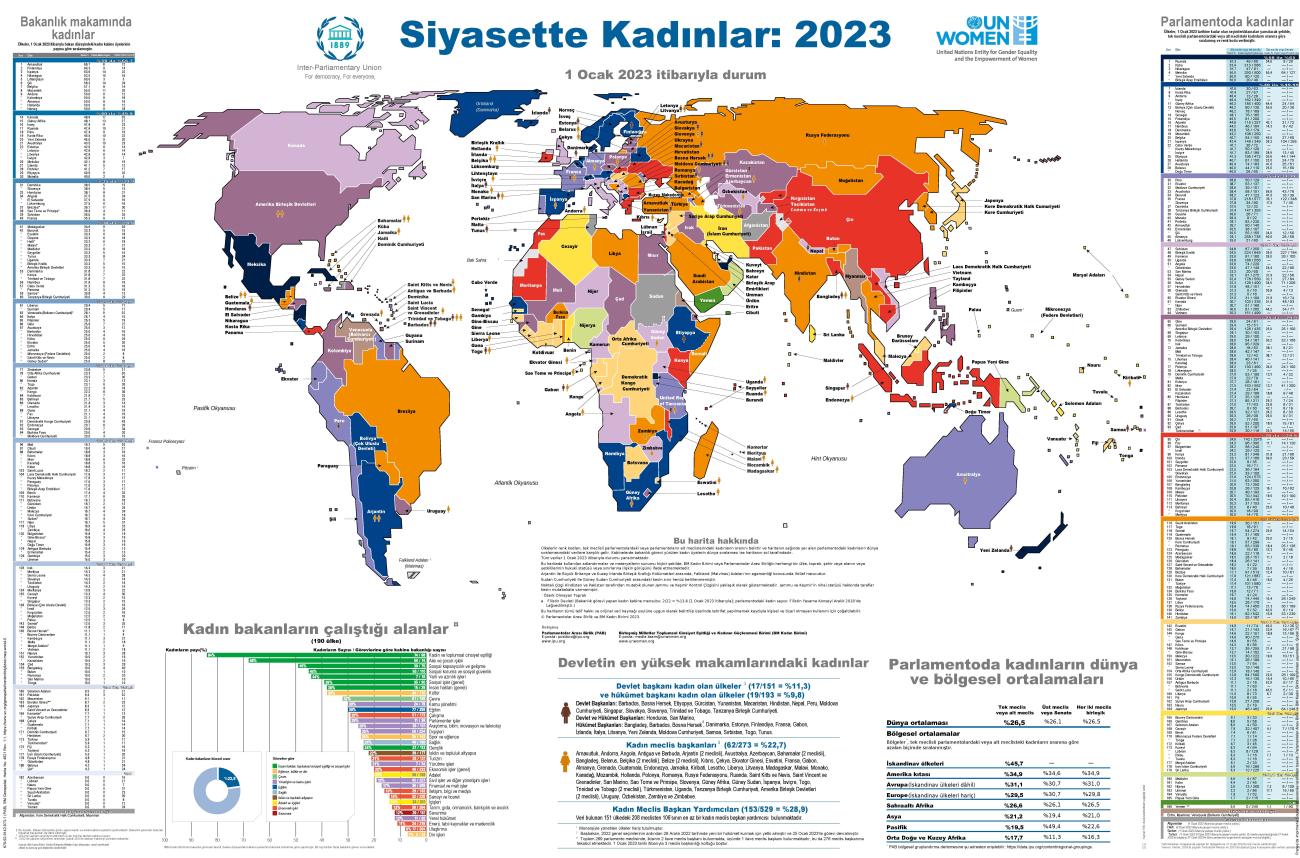According to the UN Women - IPU "Women in Politics 2023" Map: Women's participation in politics is still far from equality.

More women are participating in political decision-making worldwide, but gender equality still has not been achieved.
The 2023 edition of the Map, created by UN Women and the Inter-Parliamentary Union (IPU) since 2005, has been published. According to the IPU-UN Women 2023 Map, more women are participating in political decision-making worldwide, but gender equality still has not been achieved.
The Map shows the latest rankings and regional distribution of women in executive positions and national parliaments as of 1 January 2023. According to the data shared, while number of women in political leadership roles, both in government and in parliament is increasing worldwide, it remains very low in some countries.
UN Women Executive Director Sima Bahous said: "This data tells us that women are still the minority of Heads of State and Government. They are still deeply under-represented in government leadership, at less than one in four Cabinet Ministers, with men continuing to dominate critical portfolios such as the economy, defense, and energy. Full democracy needs the equal participation of women in all its processes. Yet, continued violence and threats – online and offline – against women leaders, candidates, and voters blight the potential for their voices and knowledge to bring the change that is so urgently needed for economic and social recovery. The world cannot afford to continue this injustice. We need a paradigm shift that brings true equality."
IPU Secretary General Martin Chungong said: "We’re seeing ongoing progress in the number of women in politics this year, which is encouraging. However, we still have a long way to go to reach gender equality when we see the current rates of growth. With the interlinked crises of climate change, geopolitical tensions, economic instability, and social inequality, the world needs to better harness the talents of women and encourage them to enter politics sooner rather than later.
Data reveals wide global inequalities
As of 1 January 2023, 11.3% of countries have women Heads of State (17 out of 151 countries, monarchy-based systems excluded), and 9.8% have women Heads of Government (19 out of 193). This is an increase compared to a decade ago when figures stood at 5.3% and 7.3%, respectively. Of all the regions, Europe continues to have the highest number of countries led by women. According to the "Women in Politics 2023" Map, the proportion of women parliamentarians has increased globally to 26.5% from 25.5% in 2021, while the number of women Speakers of Parliament increased from 20.9% in 2021 to 22.7%.
According to recent data, women represent 22.8% of ministerial positions as of 1 January 2023.The regions with the highest share of women in ministerial positions are Europe and North America (31.6%) and Latin America and the Caribbean (30.1%). Central & South Asia and the Pacific Islands are the regions where women are least represented in ministerial positions with 10.1% and 8.1% respectively. In many European countries (13 countries), on the other hand, more than 50% of heads of ministries are held by women.
Although underrepresented, women hold ministerial positions on environment (32%), public administration (30%), and education (30%), and are in leadership positions on gender equality, human rights, and social rights. In contrast, men continue to dominate ministries such as economy, defense, justice, and interior.
The situation in Türkiye according to the "Women in Politics: 2023" Map
Structural barriers to women's equal participation in political life can only be addressed through temporary special measures with specific targets. One of the most important temporary special measures is gender quotas, which can be in different forms. Within the framework of these practices, especially towards the upcoming parliamentary elections in Türkiye, it is of great importance for political parties to include more women candidates in their lists and to place women in winnable positions on candidate lists. Examples include adopting gender quotas accompanied with a ranking/placement provision like zipper system to place women in the winnable positions in the lists. Although there are no legislated gender quotas, political parties can apply their own gender quotas for candidate lists as well as all management and decision-making positions to ensure equal participation. Political parties providing financial support to women candidates not only for their nomination fees but also for their campaign work and throughout the election period would also contribute significantly as a temporary special measure.


